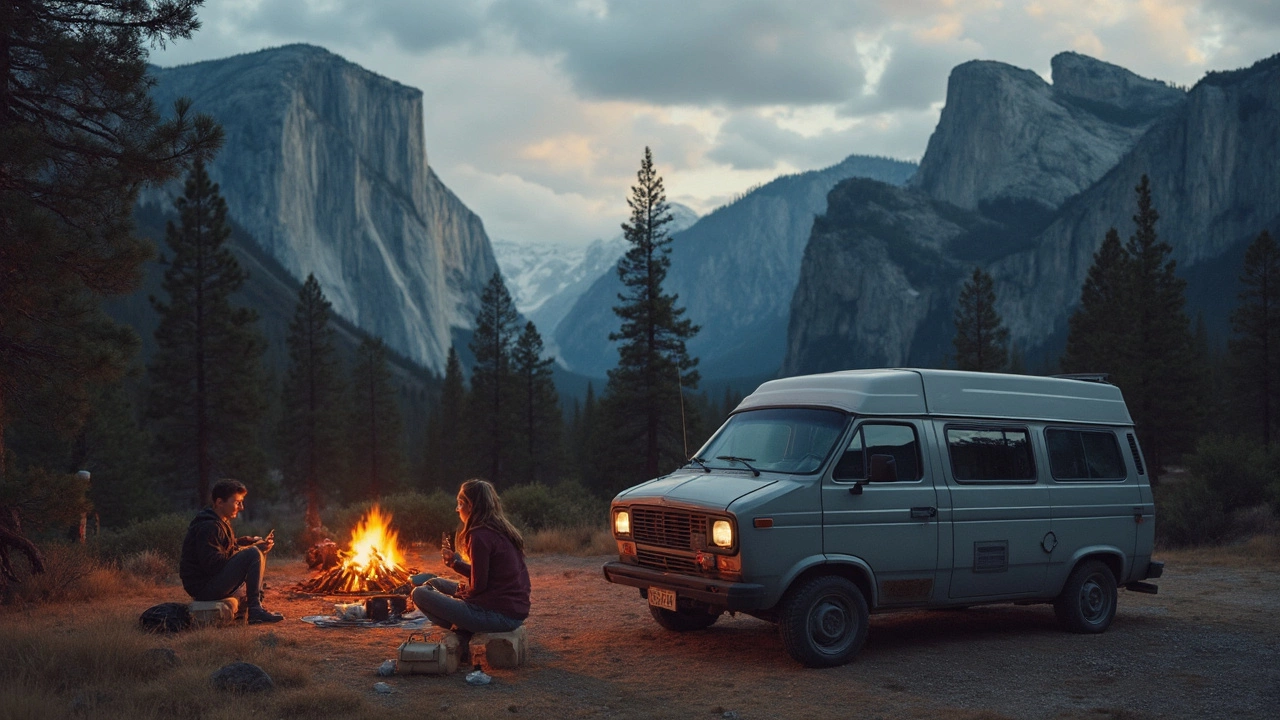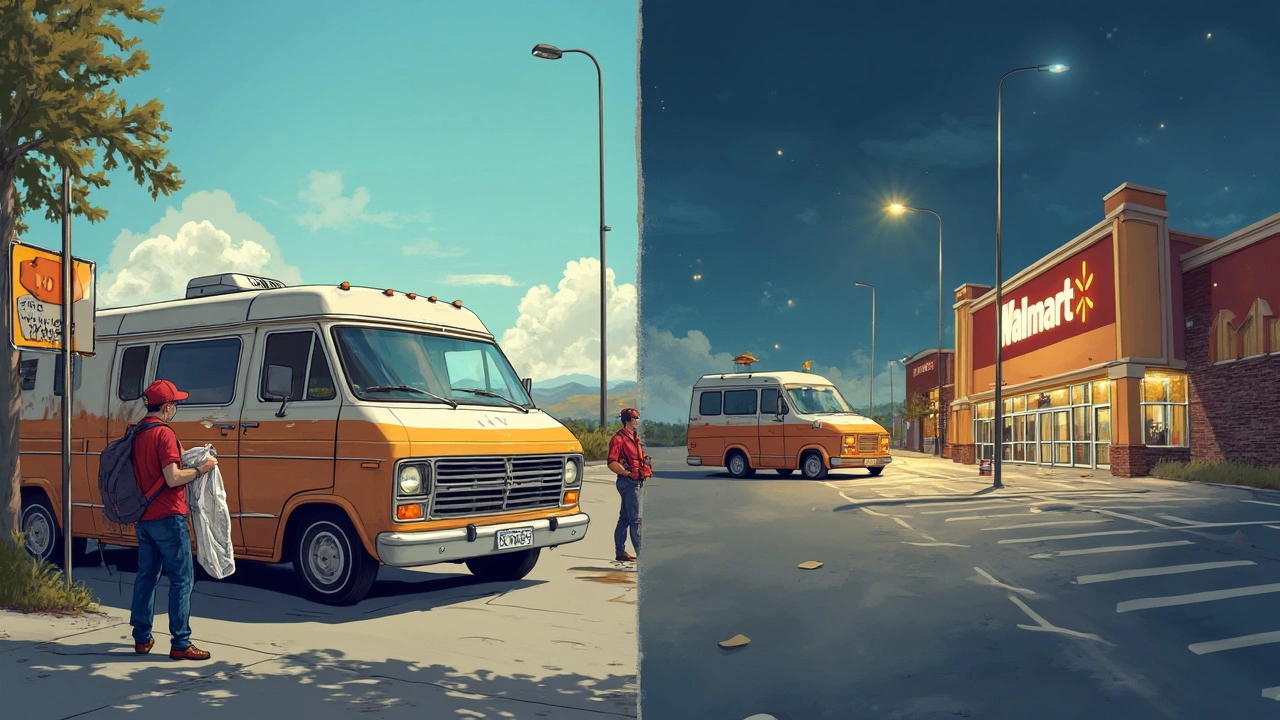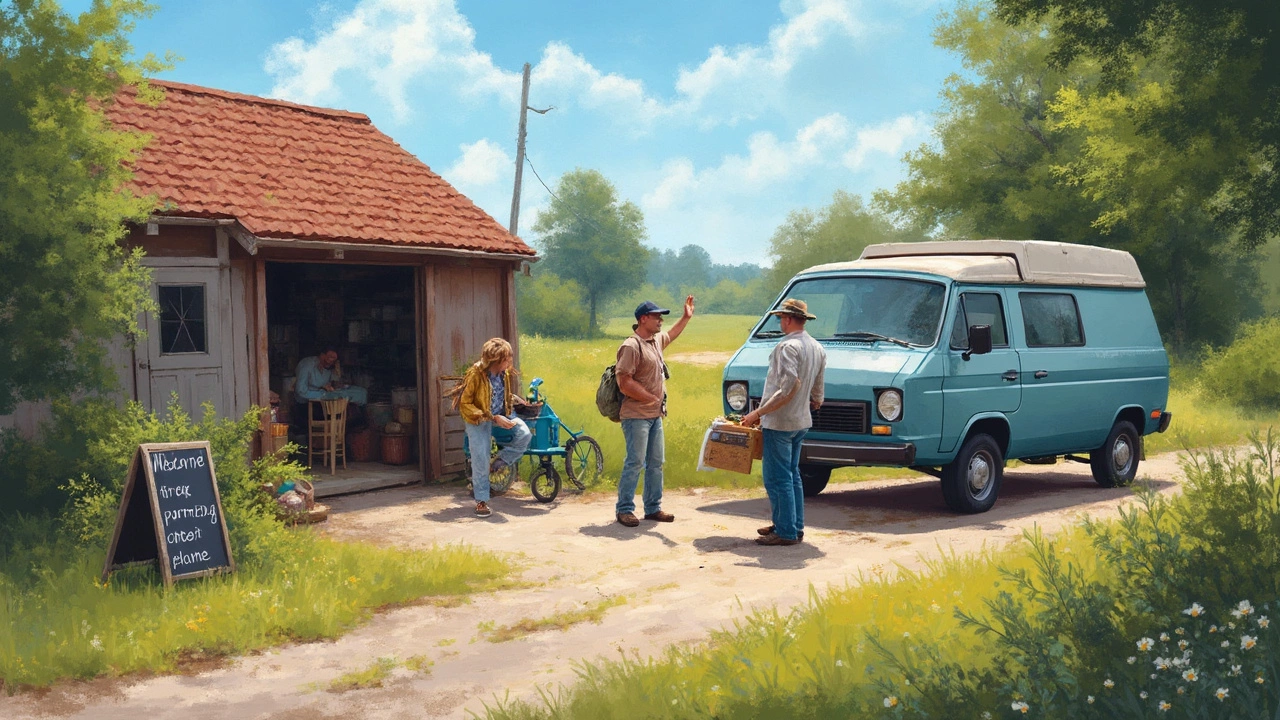Can You Park a Campervan Anywhere in the US? The Real Deal Explained
 May, 22 2025
May, 22 2025
Just because you see an empty patch of land doesn’t mean you can set up your campervan for the night. There’s a big difference between dreaming about a trip where you can park anywhere, and what US rules actually allow. Some places are fine with you pulling over, others have strict laws, and a few will slap you with a fine (or even tow your ride) if you’re caught in the wrong spot.
So where does that leave your plans? It all depends on the land you’re eyeing—whether it’s government-owned, private property, or somewhere in between. Places like Walmart parking lots used to be popular with vanlifers, but even big box stores have started putting up ‘no overnight parking’ signs in certain towns.
If you want hassle-free nights, you’ll need to learn the rules of each state, city, and even individual parking lot. Let’s get into what’s allowed, what’s risky, and how real people get safe, comfortable sleep in their campervans without breaking a bunch of laws.
- What the Law Actually Says
- National Parks, Forests, and Public Land Loopholes
- The Truth About Parking Lots and Stealth Camping
- How to Avoid Fines and Angry Neighbors
- Smart Tips for Worry-Free Campervan Parking
What the Law Actually Says
The truth is, there’s no single rule for parking your campervan anywhere in the US. The country’s a patchwork of different city, county, and state laws. Federal property, like national parks or forest land, comes with its own set of rules. Even different neighborhoods can have totally opposite attitudes about overnight campers.
Most streets in cities and suburbs ban overnight parking for non-residents, and tons of towns have ordinances specifically targeting RVs and campervans. If you park in the wrong spot, you could end up with a ticket, your van could get towed, and in extreme cases, you might face a court date. Some states (like California and Florida) are known for strict parking enforcement, especially near beaches and in metro areas.
As for highways and rest stops, most states let you park at official rest areas, but only for a limited time, often around 8 hours. You can sleep in your van at many of these stops, but you’re not allowed to set up a camp with chairs or grills outside. Truck stops are a solid backup; they want you rested and out of the way, but a quick check at the front desk never hurts.
Private property? That’s a hard no unless you get the landowner’s okay. Even if it looks abandoned, you need permission to avoid trespassing. Some businesses still allow overnight parking—Walmart, Cracker Barrel, Cabela’s—but always double check for signs or ask inside, since local laws might override the corporate policy.
When you see legit overnight spots, like campgrounds and dedicated campervan parking areas, you’re usually safe. These come with a small fee but are the best bet if you want zero hassle from law enforcement or property owners.
National Parks, Forests, and Public Land Loopholes
Here’s where things get interesting for anyone driving a campervan: public land is where most folks hope they can park with no troubles. But the rules aren’t the same everywhere, and a little research saves a lot of headache. Let’s break it down.
First, you can’t just pull up in a campervan parking spot at a national park and spend the night unless you’re booked into an official campground. Most national parks are strict about this. Overnight parking outside these campgrounds (even in the visitor center lots) will often get you a ticket. Some popular parks like Yellowstone and Yosemite are especially prompt with patrols. Campsites inside the parks fill up months ahead, especially in peak season, so if you want to stay there, reserve as early as you can.
National forests are much more flexible. This is where ‘dispersed camping’ comes into play—usually, you can camp for free, up to 14 days, in most national forests and on Bureau of Land Management (BLM) land, as long as you’re at least one mile away from developed recreation areas and not blocking roads or harming the vegetation. Still, every forest has its own rules, so check the local ranger station or their website before you roll in.
Here’s a quick cheat sheet comparing the basics:
| Type of Public Land | Can I Park Overnight? | Any Fees? | Typical Stay Limit |
|---|---|---|---|
| National Park | Campgrounds Only | Yes (usually $20+) | Varies (often 14 days) |
| National Forest | Yes, with rules | Usually no, for dispersed | Up to 14 days |
| BLM Land | Yes, with rules | Rarely, unless improved site | Up to 14 days |
Public land offers freedom, but respect goes a long way. Always follow Leave No Trace principles, and don’t set up a loud camp or trash the area—even accidental messes can get future access banned.
If you’re new to this, public land managers are usually helpful if you call or stop by to ask, “Where can I park my campervan overnight?” They see all types and have maps showing where you’re welcome. And if you’re using apps like iOverlander or Campendium, double check with official sources since rules change all the time.
- Book national park spots as far ahead as possible—especially in summer.
- Look for “dispersed camping” or “undeveloped camping” in national forests and BLM zones.
- Always check local rules; what works in Arizona’s wide open BLM land won’t fly near busy California parks.
The upshot? You’ve got a ton of options for legal, often free campervan camping, but you’ve got to do your homework before hitting the road.

The Truth About Parking Lots and Stealth Camping
If you’re cruising around the US in a campervan, it’s tempting to roll into the nearest parking lot and call it a night. The reality? It’s a mixed bag. Some national chains actually let *you* stay overnight, but it’s not a free pass everywhere. Here’s how it actually works.
Big names like Walmart, Cracker Barrel, and Cabela’s have a reputation for being RV-friendly. But there’s a catch: it totally depends on local laws and that location’s management. In fact, about half of all Walmarts in the US have stopped allowing overnight stays due to city ordinances or past abuse. Best move is to go inside, ask for permission, and keep the stay low-key. Don’t pull out the grill or set up chairs—just park, sleep, and move on.
Here’s a quick glance at how some top chains handle campervan parking these days:
| Chain | Overnight Policy | Notes |
|---|---|---|
| Walmart | Varies by store | Always ask; 50% of locations allow it |
| Cracker Barrel | Usually yes | Park in back, ask manager |
| Cabela’s/Bass Pro | Usually yes | Designed RV spots at some stores |
| Costco, Target | Rarely | Most do NOT allow it |
Now, about ‘stealth camping’—that’s parking in an urban area and blending in so nobody notices you’re sleeping there. It sounds cool but you’re rolling the dice. Most cities have laws against sleeping in vehicles overnight, especially around neighborhoods or downtown areas. Police sometimes do patrol and may ask you to move.
If you still want to try stealth camping, follow these tips:
- Keep your van looking ordinary—no decals, nothing flashy.
- Arrive late, leave early, and don’t hang around.
- Don’t make noise or draw attention. This means no music, lights, or partying.
- Keep curtains closed and lights dim.
- Know local laws. Some cities (like Los Angeles and San Diego) are really strict and ticket aggressively.
It’s smart to have backup options. Apps like iOverlander and AllStays let you see where others have parked successfully, and which places are best skipped. If you want to avoid tickets or angry knocks, stick with marked RV spots, ask permission, or use apps to check recent reports before picking a spot.
How to Avoid Fines and Angry Neighbors
Parking your campervan in the US without getting in trouble is a real balancing act. One bad move and you might wake up to flashing lights or a not-so-friendly knock from locals. Here’s how to keep things smooth—so you don’t end up paying a ticket or making enemies on the road.
- Campervan parking 101: Always check local regulations before stopping. Some cities—like Los Angeles and San Diego—are notorious for banning overnight parking everywhere but designated sites. Apps like iOverlander and Campendium help you research legal spots and read recent reviews from other travelers.
- Respect private property. If there’s no clear sign, don’t assume you’re good to stay. Knock on the door or call the business if you’re in a parking lot. It’s easier to ask for permission than to deal with a tow truck.
- Keep a low profile. Don’t bust out lawn chairs, grills, or bright lights if you’re not at a real campsite. If you’re “stealth camping,” treat it like urban ninja mode—be in after dark, out early, and leave zero trace.
- Be polite to locals. Loud music, pets off-leash, or blocking driveways will get you reported, fast. In smaller towns, folks notice anything unusual, so always be courteous and respectful.
- Never dump waste anywhere but approved stations. Trash, gray water, or even a leaky cooler can turn a tolerant community against all vanlifers. Search for nearby RV dump points—you can usually find them at truck stops or big campgrounds.
If someone asks you to move, stay calm and apologize—even if you think you’re in the right. Sometimes it’s just not worth arguing. And if you get a ticket, pay it. Trying to avoid fines can end up costing you more in the long run, especially if you’re caught in a strict county. Being proactive about the rules and showing a little respect for the spots you crash will keep you rolling without drama—or surprise expenses.

Smart Tips for Worry-Free Campervan Parking
Parking your campervan stress-free in the US is totally doable if you play it smart. Knowing the rules goes a long way, but your attitude, habits, and even the look of your van matter too. Here’s how people turn that dream road trip into reality—without police visits or surprise tickets.
- Campervan parking: Parks, rest stops, and BLM (Bureau of Land Management) land are usually your best bet for legal, free spots. BLM land covers huge areas out west, especially in states like Nevada, Arizona, and Utah. Camp there for up to 14 days—no permit, no hassle.
- Use apps like iOverlander, Campendium, and AllStays. These aren’t just fancy gadgets. Real travelers report daily on safe, legal overnight spots, up-to-date rules, and the pro tips you won’t get from brochures.
- Follow the “leave no trace” rule. That means no trash, no loud music, and don’t set up a campsite vibe in the middle of a parking lot. Basically, try not to draw attention to yourself.
- If you want to crash at a Walmart or Cracker Barrel, always ask the manager first—even if the app says it’s okay. Town ordinances sometimes override what the store wants, so that extra 30 seconds can save you a big headache.
- Plan for backup spots. Sometimes you’ll show up and find new “no overnight parking” signs. Keep a short list of nearby alternatives, especially in busy areas or near popular attractions.
- Blend in as much as possible. Cover your windows, keep lights low, and skip the rooftop deck party. The more your van looks like a regular parked vehicle, the less likely you’ll get a knock at 2 a.m.
- Watch for local rules. Some cities—especially on the west coast—have cracked down on overnight parking. Places like Los Angeles and San Francisco have specific streets where sleeping in a vehicle is a no-go, no matter what apps say.
- If you’re parking long-term or near houses, talk to neighbors. A quick, friendly intro can make all the difference—they’ll know you’re not trying to move in, just passing through.
So, use your phone, know your land, and respect the places and people around you. With a little planning, you’ll find plenty of safe, legal, and even scenic spots to park your campervan across the US. The stories you’ll bring back beat the risk of a parking ticket any day.